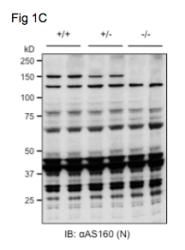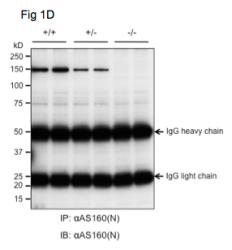Full Name
GST-AS160 (1 - 280)
Long Name Textual
AKT substrate 160 kDa
Synonyms
TBC1D4
Immuno Sequence
GST-AS160 (1 - 280) [DU 16214]
Mono/Poly clonal
Polyclonal
Gel Image

Fig 1C from publication - Expression of AS160 in soleus muscle of eight-week old male wild type, heterozygous and homozygous AS160 ‘knock-out’ mice. Because of the genetic strategy used, there was a theoretical possibility that the so-called ‘knock-out’ mice might actually produce a peptide spanning 1-609aa of AS160 plus a short sequence of HCPVSPAHVQGE. However, these Western blots of 40 μg of soleus lysates using the AS160(N) antibody show that the theoretical AS1601-609 fragment was not detectable in the extracts of soleus muscle from the AS160 knockout mouse. The blots also show that the heterozygous mice produce less AS160 protein that the wild-types, and that the AS160 is missing from the homozygous knock-outs.

Fig 1D from publication - Immunoprecipitation of full-length AS160 and truncated AS160 lysates of gastrocnemius (GAS) muscle. GAS muscle was removed from eight-week-old male mice. AS160 proteins were immunoprecipitated from 500 μg of GAS lysates using the anti-AS160(N) antibody. The immunoprecipitates were analysed via Western blot using the anti-AS160(N) antibody (1 μg/ml, 4oC overnight). This figure shows that the AS160(N) antibody could immuno-precipitate the full- length AS160 protein from GAS muscle of wild-type mouse, less full-length protein and no detectable AS1601-609 fragment from the heterozygous AS160 knockout mouse, and more importantly no detectable full-length and AS1601-609 fragment from the homozygous AS160 knockout mouse. These data showed that the AS160 knockout mouse generated in this study was suitable for addressing the effects of loss-function of AS160 on glucose metabolism.
Sheep No
S149D
Unit Source
Aliquot
0.1mg
Price
£150.00


